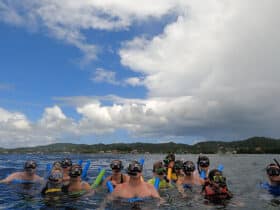Think you’re not a tour person? Maybe it’s time to rethink that idea. In the last decade, I’ve watched a real evolution in the offerings of group tour operators and guided group tours. While the misconception that they’re all just travel tours for seniors is still alive and kicking, the tours of today are filled with an incredible mix of retirees, families, solo travelers, women-only travel groups, and young people looking to see more of the world without the hassle of planning and booking every detail.
One of the most popular group tour destinations for all ages is Europe, with its famed architecture, romantic villages, sophisticated cities, and natural beauty. But choosing a guided tour to any of Europe’s best vacation spots can be a daunting task.
How to Find the Right Europe Guided Tour for You

Tour operators are as varied as the tours they offer, so it’s important to consider both the right itinerary and tour company for your preferences and needs when you’re looking at trips to Europe. Whether you’ve got your eye on European capitals, the Swiss Alps, Eastern Europe, or something else, these nine tips will help you choose your perfect-fit guided tour in Europe.
EUROPEAN VACATIONS: 10 Great Spain Tours You Can Take in 2024
1. Research tour costs and compare what’s included and what’s not.
Cost is a huge factor when booking tours, but it’s not as simple as figuring out which is cheapest. Yes, it’s true that there are some more affordable tour companies and some companies that charge a premium, but there are some substantial differences in what’s included in the cost.
VIVE LA FRANCE: 7 Immersive France Tours You Can Take This Year
Some European tour prices include everything from activities to most meals, while others will only include some activities and a small selection of meals. The cost of food—and anything you may want to do in your free time—are all things to consider before booking. After all, it makes sense to make the most of travel to Europe, so scrimping on activities isn’t generally the right approach. The added financial burden of things not included in a trip can bring the overall cost up dramatically, even if you think you’re getting a deal on the up-front price.
2. Learn about the pace of the tour.
There’s nothing worse than being beyond-exhausted by the time you return to your hotel each night on a European tour. After the cost of the trip, the second most important thing to look at when you’re comparing European tours is the pace of the tour.
WHAT TO PACK: 10 Essentials for Your Carry-on Bag
And while maximizing value with lots of activities is appealing, you should also consider the amount of down time built into the itinerary, since free time can be a great opportunity to explore a city on your own or to simply relax and recharge at the hotel to get ready for the next day of adventure.
3. Look for a mix of famous attractions and local experiences.
Does the tour go to the most popular Europe tourist attractions in the destinations it visits? Probably. But the best European tour packages will also take you to lesser-known, off the beaten path destinations and give you some sort of backstage access.
GO WITHOUT THE GROUP: 4 Great Tour Companies with Independent Tours
Check the itinerary to be sure there’s a good mix of the must-see tourist attractions (like the Louvre in France or the Colosseum in Rome) and local experiences—think wine tastings in the caves of the Louvre or hands-on pasta-making classes. When you’re checking for the mix of experiences, also look to see if there are some experiences led by locals. Some companies offer things like a meal in a local’s house or the chance to visit a local artisan to learn about a traditional regional craft. These chances to learn from and talk to locals can be a priceless addition to a tour.
4. Find out the target audience and group size of the tour.

Every tour operator has a different target audience and group size that should be considered in your decision-making process. For example, Adventures by Disney is known for family travel adventures on which children can be as young as five years old, Road Scholar has a strong learning focus, and Intrepid attracts adventure travelers. By first making sure the tour company’s demographic fits your expectations, you’re going to be a lot closer to finding your just-right tour even before you choose an itinerary. (Note: One of the things we’re great at here at TourScoop is our deep-dive reviews featuring everything you need to know about individual tour companies.)
TIMELESS TRADITIONS: Where to Find the Best European Christmas Market Tours
Group size is another important determining factor, and there’s benefits and drawbacks to both. While it’s easier to meet people in larger groups, traveling as part of a crowd can also make you feel like a highly visible tourist in small villages. Smaller group sizes are great for getting a hyper-local experience, but in smaller groups it can be tricky connecting with people who may already be traveling with a partner or friend. Figure out whether bigger or smaller is the better fit for you and then look for a company that has a tour that matches.
5. Find out how the tour company helps if something goes wrong.
One of the most unpredictable parts about traveling is getting to and from your destination, especially if you end up on a canceled or delayed flight, or if your luggage gets lost. Before you commit to a tour company, check to see if the company has an emergency number you can call if a flight is canceled or delayed, or if something else goes wrong while you are trying to get to Europe or back home.
6. Check the hotels you’d be staying at before booking a tour.

The hotels included on a tour’s itinerary are a huge part of the group-tour experience, especially since that’s likely where you will be having breakfast and spending some downtime. Before booking a tour, check out the hotels listed on the itinerary and read some reviews about each. Do reviewers say the rooms are clean and comfortable? What about the hotel staff being kind to guests? Is the breakfast service good—and is it quick and easy? These are all things to think about.
TOURS FOR SENIORS: 8 Best Companies for Senior Tours
Also check distance from activities. Some tour companies put guests up in centrally located hotels, which makes it easy to get from the hotel to the activities for the day. Other companies opt for less-expensive hotels farther out from the city, which means there will likely be longer driving times to activities, shorter times at attractions, and fewer options when it comes to activities on your own.
7. Get a sense for the style of the tour guides.
Each tour company has a different standard for its guides. Many companies pair up a U.S.-based guide who can easily relate to guests with a local guide who knows the ins and outs of a city and speaks the local language. Some might seek guides who are walking encyclopedias, but who may not prioritize connecting with guests. And others might have a strong service focus but who may not be able to answer every question about a place.
CULINARY ADVENTURES: Best Tour Companies for Culinary Tours
There are of course plenty of guides who are great all-arounders, able to connect and inform guests simultaneously. But it’s not a given, and the easiest way to find out what the guides are like is to look for online reviews of specific tours. Past guests tend to mention the quality of guides in their reviews.
8. Join social media groups for different tour operators.
Social media groups can be a goldmine of information about tour companies and specific tours. Consider joining a few groups for different tour companies, and spend a bit of time reading through posts. This is another great spot to find information about the guides, as well as what activities and hotels are like, and even ask how to get a deal on certain tours.
SOLO TRAVEL TOGETHER: 10 Best Tour Companies for Solo Travel
Groups like these are also a great way to meet people who may be looking at or have already booked the same tour date and company as you, so you can connect with them before your trip.
9. Consider responsible tourism.
Responsible tourism is a growing trend, especially among tour companies. Responsible tourism minimizes the negative effects of travel on the environment and local communities while maximizing the positive effects, and supports destinations in preserving what makes them special for generations to come.
WALK IN COMFORT: How to Choose the Best Walking Shoes for Travel
Many tour companies make it easy to find information about their sustainability efforts on their websites. Finding a company whose sustainability mission resonates with you can help you make sure you’re traveling with a group that works to preserve these amazing destinations. (Note: In our tour company reviews, we include a section about sustainability efforts.)















